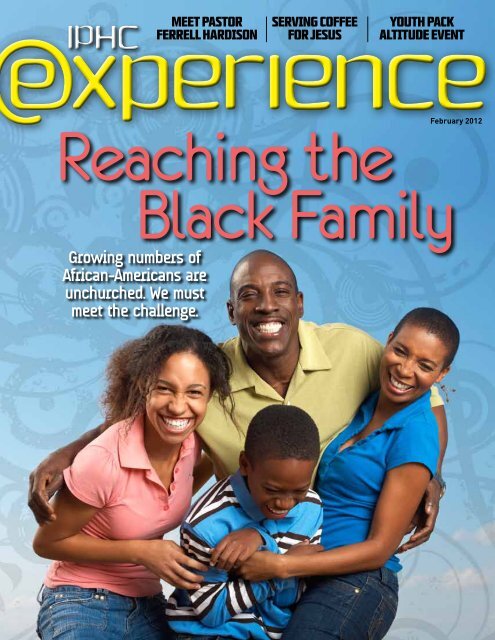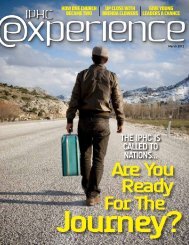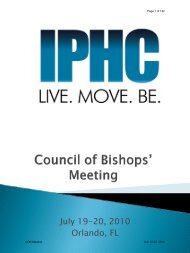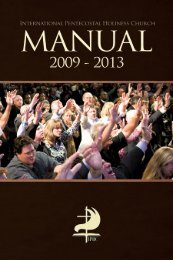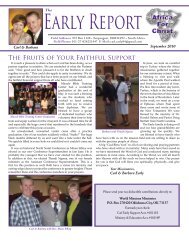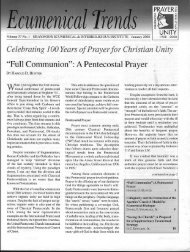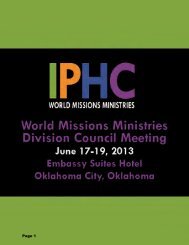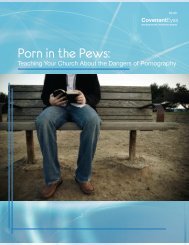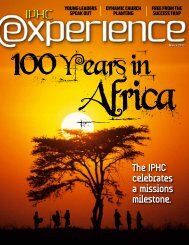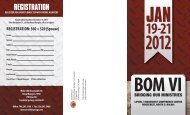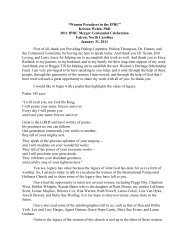single pages. - International Pentecostal Holiness Church
single pages. - International Pentecostal Holiness Church
single pages. - International Pentecostal Holiness Church
Create successful ePaper yourself
Turn your PDF publications into a flip-book with our unique Google optimized e-Paper software.
Meet Pastor<br />
Ferrell Hardison<br />
Serving Coffee<br />
for Jesus<br />
Youth pack<br />
Altitude event<br />
Reaching the<br />
Black Family<br />
Growing numbers of<br />
African-Americans are<br />
unchurched. We must<br />
meet the challenge.<br />
February 2012
Editor in Chief<br />
Dr. Ronald W. Carpenter Sr.<br />
February 2012 Vol. 9, No. 2<br />
Publisher<br />
Greg Hearn<br />
CEO, Lifesprings Resources<br />
Executive Editor<br />
J. Lee Grady<br />
Managing Editor<br />
Mégan Alba<br />
Associate Editors<br />
Jamie Powell, Sara Ray<br />
Editorial Committee<br />
Jana DeLano, Nina Brewsaugh,<br />
Annetta Lee, Kimberly Wilkerson,<br />
Kathryn Shelley, Jennifer Simmons,<br />
Sherrie Taylor, Shandra Youell<br />
Graphic Designer<br />
Beth J. Wansley<br />
WEB DESIGNERS<br />
Timothy W. Beasley,<br />
Kalanda Kambeya<br />
General Superintendent<br />
Dr. Ronald W. Carpenter Sr.<br />
Executive Committee of<br />
the Council of Bishops<br />
World Missions Ministries<br />
A.D. Beacham Jr., Vice Chairman<br />
Discipleship Ministries<br />
J. Talmadge Gardner,<br />
Corporate Treasurer<br />
Evangelism USA<br />
D. Chris Thompson,<br />
Corporate Secretary<br />
IPHC Experience (ISSN 1547-4984) Vol. 9<br />
No. 2, is published monthly except in July and<br />
December by Lifesprings Resources of the<br />
<strong>International</strong> <strong>Pentecostal</strong> <strong>Holiness</strong> <strong>Church</strong>,<br />
2425 West Main St., Franklin Springs, GA<br />
30639. Printed in the U.S.A. MMXII. Address<br />
editorial comments to IPHC Experience, P.O.<br />
Box 9, Franklin Springs, GA 30639. Or email<br />
sray@lifesprings.net.<br />
COVER PHOTO: © ThinkStock.com<br />
LSR 2012006<br />
12 Cover Story<br />
Fewer African-Americans attend church today, and they are tired of dry<br />
religious tradition. Our movement must reach them with a vibrant, relevant<br />
message. By Stacy Hilliard.<br />
PLUS: Meet some of the IPHC’s emerging black leaders: Kevin Robinson,<br />
Richard L. Scott Sr., and Eddie Cross.<br />
5 Expressions<br />
The principle of racial diversity is a core<br />
value of the IPHC. Let’s continue to<br />
reach everyone—no matter his or her<br />
color, creed or culture!<br />
By Bishop Ronald W. Carpenter Sr.<br />
6 My Experience<br />
Six years ago, Brandon Goff tried to run<br />
from God. But a life-threatening health<br />
problem got his attention—and showed<br />
him the miraculous love of the Father.<br />
8 Events<br />
Metro Ministries distributes thousands<br />
of gifts to New York kids / Altitude<br />
youth event draws record numbers /<br />
Advantage College gets new campus /<br />
Bishops’ council announces new Bylaws<br />
Committee / Deceased IPHC leaders to<br />
be publicly honored / Kevin Richardson<br />
named VP at Southwestern Christian<br />
University / Christian groups unite to<br />
defend traditional marriage<br />
PLUS: News Briefs<br />
17 Global Edge<br />
IPHC missionary Steve Cofer believes<br />
Jesus can use coffee to reach people for<br />
Christ. He has helped plant 14 Christian<br />
coffee houses in 14 countries.<br />
19 Emerging<br />
Voices<br />
North Carolina pastor Ferrell Hardison<br />
shares candidly how he took a struggling<br />
church of 70 people and revitalized it.<br />
His congregation, The Bridge, now has<br />
more than 1,200 members and is poised<br />
for more growth.<br />
22 E-Resources<br />
The IPHC’s Evangelism USA department<br />
has published God’s Mission: The Mandate<br />
of the <strong>Church</strong>. It’s a vital resource for<br />
any believer who wants to become a<br />
missional Christian.<br />
23 E-Mail<br />
Letters and commentary from our<br />
readers.<br />
iphc.org/experience | February 2012 3
Evangelism USA<br />
“<strong>Church</strong><br />
Planting<br />
Essentials”<br />
Course Description:<br />
Helping you succeed in<br />
establishing dynamic,<br />
healthy, and reproducing<br />
churches.<br />
For more information or to register:<br />
IPHC Ministries<br />
Evangelism USA<br />
P.O. Box 12609<br />
Oklahoma City, OK 73157<br />
evusainfo@iphc.org<br />
January 25-28 – Los Angeles<br />
February 2-4 – Baton Rouge<br />
405.787.7110 ext. 3322<br />
1.877.625.6478<br />
405.789.1001 (fax)<br />
iphc.org/evangelism
One Body,<br />
Many Members!<br />
By Ronald W. Carpenter, Sr.<br />
T<br />
he next time you walk through the doors of your local church, look<br />
around you. What is the average age, gender and race among members<br />
of your church? Would you say your church embraces and models<br />
diversity? Or is everyone … the same?<br />
More than 40 years ago Dr. Martin Luther King Jr. said, “We<br />
must face the sad fact that at the 11 o’clock hour on Sunday morning<br />
when we stand to sing, we stand in the most segregated hour in<br />
America … and the most segregated school is Sunday School.” Sadly, that statement<br />
still holds true to some degree today. According to a recent study by the Pew Forum,<br />
“The [American] Protestant population is characterized by significant<br />
internal diversity and fragmentation, encompassing hundreds of different<br />
denominations loosely grouped around three fairly distinct religious<br />
traditions––evangelical Protestant churches (26.3 percent of the overall<br />
adult population), mainline Protestant churches (18.1 percent) and<br />
historically black Protestant churches (6.9 percent).” Although America<br />
is seen as a “melting pot” of cultures, the 21st-century American church<br />
is still largely segregated––not just by race, but by age, culture, and other<br />
congregational preferences.<br />
The early church was marked not only by their beliefs, but also by their<br />
diversity. When Pentecost arrives in Acts 2, the crowd is amazed because<br />
they hear the Gospel in their native languages. They proclaim in verses 9-11<br />
(NIV): “Parthians, Medes and Elamites; residents of Mesopotamia, Judea<br />
and Cappadocia, Pontus and Asia, Phrygia and Pamphylia, Egypt and the<br />
parts of Libya near Cyrene; visitors from Rome (both Jews and converts to Judaism);<br />
Cretans and Arabs––we hear them declaring the wonders of God in our own tongues!”<br />
In Acts 8, persecution prompts the believers to scatter, which results in the spreading<br />
of the Gospel to all parts of the known world. Because of this, Philip has a divine<br />
encounter with an Ethiopian, Peter preaches to Cornelius and his household, and Paul<br />
shares the Gospel in the cities of Europe, including the marketplace in Athens. Jews and<br />
Gentiles, men and women, rich and poor, slave and free––individuals from all walks of life<br />
were accepted and welcomed by the early church.<br />
This principle of diversity is a guiding light of the IPHC as we carry out our Godgiven<br />
mandate for 21st-century ministry! We must remember that regardless of our<br />
differences, the same Holy Spirit is present in our midst and at work in our lives. As<br />
people who are committed to living missionally, we must be authentic followers of<br />
Christ, we must embrace the diversity of His kingdom, and we must keep diversity at the<br />
forefront of our mission.<br />
With nearly 4 million members in 103 countries, the IPHC is a naturally diverse<br />
group. As I travel the globe and continue to meet pastors and church leaders from around<br />
the world, I am amazed at the diversity among<br />
our churches. Some of our fastest growing<br />
ministries and most influential churches thrive<br />
in highly diverse, non-traditional settings.<br />
Our largest congregation, Redemption<br />
World Outreach Center in Greenville, S.C.,<br />
(17,500 members) is 40 percent Caucasian<br />
and 60 percent African-American in<br />
constituency and leadership. Mission: M25<br />
works with the overlooked and neglected of<br />
the world, literally going into the “highways<br />
and byways” to share the Gospel with those<br />
who have lost hope. Mercy Movement seeks<br />
to raise awareness of, and ultimately eliminate,<br />
human trafficking by exposing operations<br />
in cities across the U.S. Our Coffee House<br />
Ministry plants coffee houses across the globe,<br />
providing a non-threatening environment<br />
for people to commune with others and<br />
hear the Gospel while being fed. People to<br />
People Ministries provides food, clothes and<br />
schooling for children around the world, as<br />
well as providing humanitarian aid when<br />
natural disasters strike. And let us not forget<br />
our missionaries, who are in 100 countries and<br />
counting, sharing the Gospel with people of<br />
all races, tribes, tongues, creeds and cultures.<br />
In Revelation 5:9, we<br />
hear the songs of praise to<br />
the Lamb who “purchased<br />
men for God from every tribe<br />
and language and people and<br />
nation” (NIV). As the time<br />
draws nearer for the Lord’s<br />
return, let us continue to be<br />
diligent in reaching out to<br />
those who need the healing<br />
and liberating message of the<br />
Gospel. The time has come for<br />
us to step out of our comfort<br />
zones, cultural norms and<br />
complacency. Whether it’s a homeless mother,<br />
a tattooed teenager, or a tribal leader––all need<br />
to experience the Gospel firsthand.<br />
Scott Williams, author of the book <strong>Church</strong><br />
Diversity, says, “The bottom line is this: it’s no<br />
longer acceptable for God’s chosen vessel, the<br />
local church, to be one of the most segregated<br />
institutions in the world.”<br />
God has entrusted us with a sacred<br />
mission. Let us not grow weary in reaching<br />
out to the lost––no matter their color,<br />
clothing, creed or culture. The IPHC is<br />
committed to Live, Move, and Be!<br />
We will – LIVE IN HIM!<br />
We will – MOVE FOR HIM!<br />
We will – BE LIKE HIM!<br />
iphc.org/experience | February 2012 5
In the Father’s arms: Brandon Goff with his wife, Megan, and son, Brody.<br />
God Wouldn’t Let Me<br />
Run From Him<br />
The Lord used a life-threatening health issue to heal my broken heart.<br />
BY Rev. Brandon Goff<br />
I knew God was calling me to<br />
ministry even before I accepted Him as my savior. At the<br />
age of 16, I gave my life to the Lord. At 18, my childhood<br />
vision became reality as I accepted my first youth<br />
pastorate while attending Emmanuel College.<br />
Shortly after graduating from college, I took a full-time<br />
youth ministry position in South Carolina. That was<br />
when I decided I hadn’t “lived” enough. I broke up with<br />
my good Christian girlfriend. I turned to alcohol and<br />
recreational drugs to numb the pain and frustration I felt.<br />
Living testimony: Brandon shares a message of<br />
love and healing during a youth service.<br />
6 February 2012 | iphc.org/experience
I decided that money, parties and friends<br />
were more fun than church ever was. I no<br />
longer wanted to be a pastor, and I ran<br />
from everything that looked like ministry.<br />
But God loved me too much to let me<br />
stay that way.<br />
One day, I bent down to pick up a drill<br />
from my work truck. Suddenly, my chest<br />
felt heavy, painful and tight. I couldn’t<br />
breathe and I began to black out. I had<br />
to sit down to catch my breath and calm<br />
myself.<br />
On my way home from work, I called<br />
my mother, who immediately scheduled<br />
an appointment with my doctor. After<br />
conducting several tests, the doctor<br />
sent me to the hospital for overnight<br />
observation.<br />
I was shocked, scared, frustrated and<br />
angry. I was 23 years old, far too young to<br />
have heart problems! Surely this was just a<br />
blip on the radar of life.<br />
In the hospital, I was diagnosed with<br />
Wolff-Parkinson-White syndrome.<br />
Doctors said a two-hour surgery would<br />
fix the issue. I thought, It can’t be that bad<br />
if a little surgery fixes the problem, right? So<br />
I agreed to the procedure, thinking I’d be<br />
better in no time.<br />
After six hours in surgery, the doctor’s<br />
prognosis terrified me: “We couldn’t fix it<br />
all. It’s worse than we thought.” I asked<br />
why I had deep red marks on my chest and<br />
ribs. He responded, “We had to shock you<br />
back three times during the procedure.”<br />
This was the moment God began to<br />
speak in my life. It became clear that my<br />
current path was not carrying me to the<br />
eternal destiny I desired, or the one God<br />
wanted for me. I saw that my blatant<br />
disrespect and disregard for God was not<br />
just affecting my life––it was breaking<br />
God’s heart as well. I decided I wanted to<br />
“go to heaven,” but I made it clear to God<br />
that I didn’t want to give up control of my<br />
life.<br />
One week later, I had another surgery<br />
to correct my heart problem. Once again, I<br />
died on the table. “Your heart quit beating<br />
for 10 minutes during the procedure,”<br />
the doctor told me. “We kept it beating<br />
artificially. The hand of God was definitely<br />
in there with you.” Later that night, I went<br />
into what is known as complete heart<br />
block. I began to experience severe chest<br />
pain and shortness of breath, and I was<br />
quickly moved to critical care.<br />
Lying in that room, wearing an oxygen<br />
mask, getting sick over the side of the<br />
bed, and feeling drugs pumping into my<br />
body through an IV, I was overcome with<br />
defeat. I begged my dad, “Please! Let it<br />
stop hurting, or let me die.”<br />
But in the midst of the pain and fear,<br />
my heavenly father spoke: There is more to<br />
your life than what you’ve been doing.<br />
The next day, I learned I would need<br />
a pacemaker. Once again, I prepared for<br />
surgery. I offered a silent yet sincere prayer:<br />
If there is truly more to my life than what<br />
I’ve been living, I want it. I know you are<br />
great, good and perfect, but I haven’t been. I<br />
need your forgiveness, love, grace and mercy…<br />
and I give you all of my life. I love you! That<br />
day, I felt different. I was at peace, content,<br />
confident. There was no fear of death––not<br />
because I wanted to die, but because I<br />
knew there was more to life.<br />
It’s been six years since my lifechanging<br />
experience, and my heart is still<br />
being constructed. I will always have a scar,<br />
a pacemaker, and regular surgeries to keep<br />
my heart beating normally––but these<br />
are temporary trappings that will one day<br />
fade. More importantly, I have an undying<br />
passion for God, an understanding of his<br />
endless chances, and an eternal encounter<br />
with His presence.<br />
Soon after my ordeal, I came back to<br />
the church and embraced my calling as a<br />
pastor. Today, I am planting a church in<br />
Columbia, S.C. I am determined to help<br />
people walk in the life that God intended<br />
for his children.<br />
When I look at my life, I often think of<br />
the nursery rhyme “Humpty Dumpty”:<br />
All the king’s horses<br />
And all the king’s men<br />
Couldn’t put Humpty together again.<br />
When earthly men couldn’t fix me, the<br />
King of Kings put my broken heart back<br />
together––and for that, I am eternally<br />
grateful!<br />
Brandon Goff is the associate pastor at<br />
Ebenezer PH <strong>Church</strong> in Elgin, SC. He<br />
and his wife, Megan, are also planting a<br />
church in Columbia, SC.<br />
Have you had the Experience? Send your testimony to Sara Ray at<br />
sray@lifesprings.net.<br />
How to<br />
Experience God<br />
Here are five simple steps you can<br />
take to begin a relationship with God:<br />
1. Recognize your need. The Bible<br />
tells us that “all have sinned and fall<br />
short of the glory of God” (Rom. 3:23,<br />
NASB). All of us are sinners, and we<br />
must admit our need for a Savior.<br />
2. Repent of your sins. Because<br />
God is completely holy, our sins create<br />
a wall that separates us from Him.<br />
By confessing your sins you will find<br />
forgiveness. “Repent” means to make<br />
a 180-degree turnaround. The Bible<br />
promises: “If we confess our sins, He<br />
is faithful and righteous to forgive us<br />
our sins and to cleanse us from all<br />
unrighteousness” (1 John 1:9).<br />
3. Believe in Jesus. God worked a<br />
miracle when He sent His only Son<br />
to die for us. We don’t have to pay for<br />
our sins … Jesus paid it all! We can’t<br />
work for our salvation. It is a gift from<br />
God, and all He requires is that we<br />
believe. Put your faith in Him. The Bible<br />
says: “For God so loved the world,<br />
that He gave His only begotten Son,<br />
that whoever believes in Him shall not<br />
perish, but have eternal life” (John<br />
3:16).<br />
4. Receive His salvation. God has<br />
given us this free gift, but we must<br />
accept it. Thank Him for sending Jesus<br />
to die on the cross for you. Thank<br />
Him for His amazing love, mercy and<br />
forgiveness. Then ask Him to live in<br />
your heart. His promise to us is sure:<br />
“But as many as received Him, to them<br />
He gave the right to become children of<br />
God...” (John 1:12).<br />
5. Confess your faith. The Bible<br />
assures us: “If you confess with your<br />
mouth Jesus as Lord, and believe in<br />
your heart that God raised Him from<br />
the dead, you will be saved” (Rom.<br />
10:9). You have been born again and are<br />
now part of God’s family. Tell someone<br />
else what Jesus has done in your life!<br />
This amazing experience can be yours.<br />
Embrace God’s love and receive the<br />
salvation that only Jesus Christ gives.<br />
iphc.org/experience | February 2012 7
More than 110,000 kids received gifts in<br />
this year’s campaign.<br />
Making Christmas bright: A child holds up her stocking during Sidewalk Sunday School.<br />
Metro Ministries Distributes<br />
Over 100,000 Christmas Gifts<br />
to Needy Children<br />
Operation Holiday Hope teaches inner-city children the true<br />
meaning of Christmas.<br />
BY Sara Ray<br />
While millions of people in New<br />
York City spent the week before<br />
Christmas shopping for those lastminute<br />
holiday gifts, the staff and<br />
volunteers at Metro Ministries were<br />
busy handing out thousands of presents<br />
to children throughout the city and<br />
around the world. Founder and Pastor<br />
Bill Wilson estimates that his Brooklynbased<br />
ministry to inner-city children<br />
distributed around 110,000 wrapped<br />
Christmas gifts as part of 2011’s<br />
Operation Holiday Hope.<br />
Founded in 1995, Operation Holiday<br />
Hope is an annual Christmas outreach<br />
designed to share the gift of Christ<br />
by providing an individually wrapped<br />
Christmas present to each child who<br />
attends one of the numerous Metro<br />
Ministries Sunday School programs<br />
in urban areas around the world. It<br />
also includes the Christmas Stocking<br />
Project, which has been adopted as a<br />
national emphasis by the IPHC Women’s<br />
Ministries.<br />
“A handmade Christmas stocking or<br />
an individually wrapped Christmas gift<br />
doesn’t seem very important … but it’s<br />
always been the little things that impact<br />
someone’s life when they know it’s been<br />
given through the love of Christ,” says<br />
Wilson. “Each one of these Christmas<br />
gifts is symbolic of the love of Christ that<br />
was given at Christmastime.”<br />
On Saturday, Dec. 17, a fleet of<br />
yellow school buses ferried hundreds of<br />
children to the Metro Ministries <strong>Church</strong> to<br />
attend one of four Indoor Sunday School<br />
sessions. The children played games,<br />
sang songs, and returned home with<br />
a newfound knowledge of the greatest<br />
gift of all, as well as the only Christmas<br />
present or stocking many of the children<br />
received during the holidays.<br />
For more information about Metro<br />
Ministries and Operation Holiday Hope,<br />
visit www.metroministries.org.<br />
Joy to the world: Metro<br />
Ministries takes the Christmas<br />
message to the streets of<br />
Brooklyn.<br />
8 February 2012 | iphc.org/experience
A new record:<br />
Nearly 150 teens<br />
and leaders<br />
attended Altitude.<br />
Altitude<br />
Reports<br />
Record<br />
AttendancE<br />
A new location provides<br />
growth for the winter youth<br />
experience.<br />
Altitude 2012 was a leap of faith that<br />
paid off for teens and leaders alike.<br />
Event organizers made the decision to<br />
move the event from Denver, Colorado,<br />
to Oklahoma City, Oklahoma.<br />
“While Colorado was a great<br />
location, the travel was a challenge for<br />
our churches and teens,” said Scott<br />
Hampton, Discipleship Ministries<br />
director for the Great Plains Conference.<br />
“We wanted a more central location that<br />
would allow us to connect with more<br />
people.”<br />
With nearly 150 teens and youth<br />
leaders in attendance, Hampton says<br />
it was the right move. This year’s event<br />
took place at the Heartland Conference<br />
Campground, which provided an<br />
Advantage Gets<br />
New Campus and<br />
New VP<br />
The IPHC school experiences<br />
growth through technology and<br />
partnership.<br />
It’s a new season for students, faculty,<br />
and staff at Advantage College. The<br />
West Coast-based IPHC school recently<br />
relocated to a state-of-the-art campus<br />
in San Jose, California. In addition, the<br />
college has named Dr. Garnet Pike the<br />
new vice president overseeing Academic<br />
Development. Advantage will partner with<br />
Pike’s ministry training program, Spirit Life<br />
Ministries, to provide ongoing educational<br />
opportunities to students.<br />
New classrooms provide improved<br />
opportunities at Advantage College.<br />
accessible central location at an affordable<br />
price. Skiing was replaced by snow tubing and<br />
ice-skating in downtown Oklahoma City. Youth<br />
groups also enjoyed rock climbing, shopping,<br />
movies and museums, and other local<br />
activities.<br />
But it wasn’t all fun and games. During<br />
services, teens filled the altar for praise and<br />
worship, led by Jake Ishmael and youth from<br />
the Master’s Commission in Denver, Colo.<br />
The speaker lineup included Great Plains<br />
Discipleship Ministries Director Scott Hampton,<br />
Pastor Woody Burpo of Passion <strong>Church</strong>,<br />
<strong>International</strong> Youth Evangelist Matt Shull, and<br />
National Youth Ministries Director Rev. Charles<br />
Boyd. The highlight of the week was a New<br />
Year’s Eve bonfire, followed by a youth-led<br />
worship and prayer service to ring in 2012.<br />
Hampton says plans are already underway<br />
for next year’s event, which will also be in<br />
Oklahoma City.<br />
“We plan to stay here as long as it keeps<br />
working here,” he said. “Our biggest concern<br />
now is that we’ll outgrow this place.”<br />
–Mégan Alba<br />
“We are extremely grateful,” said Dr. Dan<br />
Greenlee, president. “We feel like God has<br />
blessed us and we’re just trying to go with<br />
it.”<br />
Greenlee says the new facility and faculty<br />
will provide more educational opportunities<br />
for both on-campus and online students.<br />
Pike brings many years of educational<br />
and practical ministry experience to<br />
this new position. Previously, he served<br />
as the Dean of the Graduate School at<br />
Southwestern Christian University. He is<br />
also an accomplished author, speaker, and<br />
evangelist.<br />
Advantage will use a School of Ministry<br />
Curriculum developed by Pike and available<br />
through Spirit Life Ministries. Pike says the<br />
curriculum was originally developed for the<br />
Equipping the Saints program.<br />
“It’s a new day for the <strong>Church</strong> and a<br />
new way of fulfilling the biblical mandate<br />
to ‘equip the saints for the work of the<br />
ministry,’” said Pike.<br />
Advantage College focuses on providing<br />
practical ministry training through the<br />
Ephesians 4 model. The school has<br />
approximately 500 students in local and<br />
virtual campuses around the world. To learn<br />
more about their programs, or to enroll, go<br />
to www.advantagecollege.org.<br />
» Carpenter Health Update<br />
Nearly 15<br />
months after<br />
beginning<br />
treatment for<br />
melanoma,<br />
Presiding<br />
Bishop<br />
Carpenter<br />
says the spot<br />
Bishop Carpenter<br />
in his lung is<br />
shrinking and<br />
his prognosis is<br />
good. After one year of treatment, the<br />
melanoma reduced by 30 percent. In<br />
November 2011, doctors tried a new<br />
drug, which reduced the melanoma<br />
by an additional 60 percent. Bishop<br />
Carpenter says he has responded<br />
well to the medication and has little<br />
to no side effects. He is thankful for<br />
the prayers and support of the IPHC<br />
family. “I feel like a new man with a<br />
new lease on life!” he says.<br />
» Former Bishop’s<br />
Wife Stable After<br />
Stroke<br />
Mrs. Jean Williams,<br />
widow of former Bishop<br />
J. Floyd Williams, is in<br />
stable condition after<br />
suffering a stroke on<br />
December 30. Williams<br />
Jean Williams<br />
is recovering in a<br />
hospital in Oklahoma<br />
City. The family asks for prayer<br />
for complete healing and a restful<br />
recovery. Bishop J. Floyd Williams<br />
was elected General Superintendent in<br />
1969 and served three terms (12 years)<br />
ending in 1981.<br />
» McSherry Named<br />
Foundation President<br />
The IPH<br />
Foundation has<br />
named Rev.<br />
Olin McSherry<br />
its first fulltime<br />
president.<br />
McSherry was<br />
previously the<br />
Olin McSherry<br />
Director of<br />
Development and<br />
Public Information at Redemption<br />
World Outreach Center in Greenville,<br />
SC. He succeeds Reggie Till, who<br />
has served the IPHF in an advisory or<br />
part-time capacity since its formation<br />
in 2001.<br />
iphc.org/experience | February 2012 9
Council<br />
of Bishops<br />
Announces<br />
Members of<br />
2013 Bylaws<br />
Committee<br />
The committee will consider<br />
recommendations for the<br />
IPHC’s quadrennial report.<br />
New guidelines adopted at the 2009 General Conference require members of the Bylaws Committee (formerly known<br />
as the Polity Committee) to be appointed two years in advance of the conference. The Council of Bishops, in its July 2011<br />
meeting in Atlanta, approved the following appointments recommended by the Executive Committee of the Council of<br />
Bishops.<br />
The Bylaws Committee desires input from church leaders and will consider recommendations for possible<br />
incorporation into their report for the 2013 General Conference. Their report will be completed by May 1, 2013. Please<br />
feel free to contact these individuals with any constructive recommendations for the IPHC.<br />
<strong>International</strong> <strong>Pentecostal</strong> <strong>Holiness</strong> <strong>Church</strong><br />
2013 General Conference Bylaws Committee<br />
Bishop Tommy McGhee, Chairman<br />
P.O. Box 150<br />
Browns Summit, NC 27214<br />
(336) 656-7936 x126 ofc<br />
674-9305 hm<br />
TMcGhee@ccrdc.org<br />
Bishop Preston Mathena<br />
P.O. Box 1086<br />
Dublin, VA 24084<br />
(540) 674-4131 ofc & fax<br />
(304) 952-1007 cell<br />
KPMathena@aol.com<br />
Bishop Dayton Birt<br />
5201 Courthouse Road<br />
Prince George, VA 23875<br />
(804) 862-9201 / (804) 641-5418<br />
Bishop.rm@gmail.com<br />
Bishop Trinidad Gutierrez<br />
P.O. Box 1306<br />
Yakima, WA 98907<br />
(509) 249-5631 ofc & fax<br />
452-7549 hm; 910-8056 cell<br />
pastorgutz2009@hotmail.com<br />
Bishop Greg Amos<br />
620 S. Ron McNair Blvd.<br />
Lake City, SC 29560<br />
(843) 394-8508 / (843) 409-0175<br />
GAmos91380@aol.com<br />
Bishop Larry Herrera<br />
3245 Eliot St., Ste. 214<br />
Denver, CO 80211-3301<br />
(303) 379-9071; 359-4289 cell<br />
(770) 381-0622 fax<br />
Pastor_larry@comcast.net<br />
Rev. Hector Andrade<br />
765 West Shore Drive<br />
Worthington, MN 56187<br />
(507) 350-9629 cell / 376-4644 hm<br />
ccw@frontiernet.net<br />
Rev. Kent Bell<br />
246 S. Mercer Ave.<br />
Greenville, PA 16125<br />
(724) 589 5433 ofc / 456-4835 cell<br />
pastorkent@blwc.org<br />
Rev. Greg Hearn<br />
P.O. Box 9<br />
Franklin Springs, GA 30639<br />
(706) 245-7272 x110 ofc<br />
(706) 245-4786 hm<br />
ghearn@lifesprings.net<br />
Ghearn@iphc.org<br />
Mrs. Linda Thomas<br />
P.O. Box 337<br />
Vanceboro, NC 28586<br />
(252) 635-5012 ofc<br />
(252) 229-2910 cell<br />
Linda@thomasdev.com<br />
Mrs. Meta Russo<br />
764 Georgia Cliff Road<br />
Tryon, NC 28782<br />
(864) 357-3334<br />
(828) 859-9565<br />
mrusso@uscciphc.org<br />
Mr. Tim Hooper<br />
7308 NW 113th Terrace<br />
Oklahoma City, OK 73162<br />
(405) 789-9193<br />
trhooper@cox.net<br />
Bishop Mike Gray<br />
6779 Taylor Circle<br />
Montgomery, AL 36117<br />
(334) 260-0600<br />
MGray@iphc.org<br />
Rev. Stan Reynolds<br />
1229 Buchanan St.<br />
Marysville, CA 95901<br />
(530) 742-8411 / 701-3391<br />
pastorstanreynolds@gmail.com<br />
Rev. Norm Wilkie<br />
5345 S. Peoria<br />
Tulsa, OK 73105<br />
(918) 299-0294<br />
nswilk@cox.net<br />
10 February 2012 | iphc.org/experience
Information<br />
Needed for<br />
Memoirs<br />
Committee Report<br />
Deceased IPHC leaders to be<br />
publicly honored<br />
The IPHC Memoirs<br />
Committee is calling<br />
for information for the<br />
quadrennial report<br />
to be presented at<br />
the next general<br />
conference.<br />
Each general<br />
conference recognizes<br />
those who have left<br />
our presence and<br />
entered heaven’s<br />
gates during the quadrennium. The report will include all former<br />
members of the General Executive Board, General Board of<br />
Administration, and all missionaries (both lay and clerical).<br />
Because of structural changes implemented at the previous<br />
general conference, the following individuals will be included from<br />
the former GEB/GBA boards:<br />
• General superintendents and their spouses<br />
• Elected general officials<br />
• Conference superintendents<br />
• Women’s Ministries directors<br />
• Men’s Ministries directors<br />
• Administrators of Advocate Press/LifeSprings<br />
• Administrators of IPHC Educational and Benevolent<br />
Institutions<br />
• Lay representatives<br />
• Ethnic representatives<br />
• Pastoral representatives<br />
• Women representatives<br />
This report will cover the time period of January 1, 2009, through<br />
December 31, 2012. If you have an obituary, funeral service program,<br />
and/or photo for individuals that fall into these categories, contact<br />
Ladonna Scott at (405) 787-7110.<br />
Richardson Named<br />
VP of Southwestern<br />
Kevin Richardson will oversee<br />
Alumni & Development for the<br />
university.<br />
Southwestern<br />
Christian University<br />
has selected Kevin<br />
Richardson as the<br />
new Vice President<br />
for University<br />
Development.<br />
Richardson brings<br />
more than 12 years<br />
of development and<br />
marketing experience Kevin Richardson<br />
to the university. Before<br />
joining SCU, he served in a wide range of senior<br />
development, communication, and leadership<br />
positions in both higher education and ministry.<br />
“We are very excited about the skills Mr.<br />
Richardson brings to Southwestern,” said<br />
Dr. Ed Huckeby, president of the university.<br />
“I am confident his leadership in the areas of<br />
development, marketing and alumni relations<br />
will assist us in taking the institution to new<br />
levels of excellence.”<br />
Richardson is an ordained minister in the<br />
Assemblies of God with deep ties to Oklahoma.<br />
He holds a B.A. in biblical studies from Central<br />
Bible College and an M.A. in theology from the<br />
Assemblies of God Theological Seminary.<br />
Organizations Unite to Defend<br />
traditional Marriage<br />
Leaders issue an open letter regarding marriage and religious<br />
freedom.<br />
Leaders from a variety of denominational backgrounds issued an open letter<br />
defending marriage as the union of one man and one woman. The letter also warns<br />
that redefining marriage threatens religious freedom and the common good.<br />
Presiding Bishop Ronald Carpenter, Sr., was among those leaders who signed the<br />
letter.<br />
Carpenter says it is important for the IPHC to join the effort to protect the sanctity<br />
of marriage because it is the key to “providing a safe environment for the birthing and<br />
nurturing of children, that they may grow to make a positive contribution to the civility<br />
of society.”<br />
The letter was also signed by Leith Anderson, president of the National Association<br />
of Evangelicals; Archbishop Timothy M. Dolan, president of the U.S. Conference of<br />
Catholic Bishops; and H. David Burton, presiding bishop of the <strong>Church</strong> of Jesus Christ<br />
of Latter-day Saints.<br />
To read the letter or learn more, go to www.nae.net.<br />
iphc.org/experience | February 2012 11
COVER STORY<br />
12 February 2012 | iphc.org/experience
A New Day<br />
Black<br />
for the<br />
<strong>Church</strong><br />
People are tired of tradition. God is calling<br />
all of us to become relevant and missional.<br />
By Stacy Hilliard<br />
The term missional has become a buzzword.<br />
Corporations, churches, and even people claim<br />
to be missional. But what is it? What does it<br />
mean to be missional? And how does that word<br />
apply to the church, and more specifically, to the<br />
IPHC?<br />
Jesus was intentional when he said, “I go and<br />
prepare a place for you … that where I am, there<br />
you may be also” ( John 14:3, NKJV). The power,<br />
influence, and commitment to quantitatively<br />
grow the kingdom of God were transferred to the<br />
body of Christ––the church––in order to further<br />
the mission of the gospel.<br />
In other words, the missional mindset simply<br />
means to be “on mission” in the community.<br />
Having a missional mindset means engaging the<br />
needs of the community. We are to be about the<br />
Father’s business, carrying out his mission on<br />
earth as we wait for His return.<br />
continued<br />
iphc.org/experience | February 2012 13
The African-American church<br />
modeled the missional mindset long<br />
before 21st-century leaders coined<br />
the term. The African-American<br />
church was the cornerstone of the<br />
community, often functioning<br />
as a civic center, food bank,<br />
shelter, and anything else<br />
the community needed.<br />
Whether it was a family<br />
reunion or a funeral, a<br />
celebration or a tragedy,<br />
the black church could<br />
be counted on to open its<br />
doors to the churched and<br />
unchurched alike.<br />
Somewhere along<br />
the way, we lost sight of<br />
that mission. The needs<br />
are still there, but our<br />
methods have become<br />
outdated and irrelevant.<br />
Although 1 in every 6<br />
churches in America<br />
is African-American,<br />
the number of<br />
unchurched African-<br />
Americans is steadily<br />
increasing. The<br />
current needs of the<br />
black community<br />
are great, and the<br />
opinion––especially<br />
among younger<br />
African-Americans––is<br />
that the church is<br />
disconnected. In<br />
order to re-establish<br />
its effectiveness<br />
and influence in the<br />
community, the black<br />
church must focus on three<br />
key initiatives:<br />
1. Engage the culture.<br />
If our focus is going to be the<br />
communication of a gospel that is<br />
applicable to a particular people<br />
group, then we must understand<br />
the cultural makeup of our target<br />
audience.<br />
For years, the black church has<br />
devoted itself to the teaching of<br />
scriptures. However, in our zeal<br />
to become biblical scholars, we<br />
mistook training for relationship. As<br />
a result, our teaching methods and<br />
our church models have become<br />
irrelevant to the next generation.<br />
The African-American church<br />
must understand that in order to<br />
reach the next generation(s), they<br />
must communicate the gospel in<br />
their culture and in their language.<br />
If Jesus is our ultimate hope and<br />
answer, then our mandate is to<br />
effectively communicate that hope.<br />
Romans 8:19, 20 says, “For the<br />
earnest expectation of the creature<br />
waiteth for the manifestation of<br />
the sons of God. For the creature<br />
was made subject to vanity, not<br />
willingly, but by reason of him who<br />
hath subjected the same in hope.”<br />
If our charge is to preserve the<br />
relevancy of the gospel, then we<br />
must not neglect the community<br />
by confining that relevance to our<br />
local congregation.<br />
2. Love the sinner,<br />
hate the sin.<br />
The younger generation<br />
distances itself because of the<br />
perceived method of the church<br />
to “badger” without remedy. The<br />
younger African-American culture<br />
grasps the concept of God, but<br />
at the same time, they view the<br />
church as being “out of touch.”<br />
All too often, we want a sinner<br />
to “clean up” before becoming part<br />
of the church. In order to reach<br />
the next generation, we must be<br />
willing to accept people as they are,<br />
then disciple them to become the<br />
leaders God has called them to be.<br />
Hair color, clothing choice, tattoos,<br />
piercings, and so on, are secondary<br />
to a relationship with the Lord. If<br />
we focus on sharing the message<br />
of the gospel, loving those in need,<br />
and providing biblical discipleship,<br />
the Holy Spirit will create lasting<br />
internal change that will eventually<br />
be expressed outwardly.<br />
3. Share our best<br />
resources.<br />
The African-American church<br />
has a tendency to “hold on” to<br />
local church leaders, rather than<br />
send them out and support them in<br />
becoming pastors, ministry leaders,<br />
and community advocates. The<br />
result is a stagnated and diminished<br />
presence in the local community. If<br />
we limit our influence to the four<br />
walls or the culture of the church,<br />
we limit the power of the gospel to<br />
change, multiply, inspire and engage<br />
the black community.<br />
No culture is exempt from<br />
being embraced and engaged with<br />
14 February 2012 | iphc.org/experience
the communication of the gospel. Our<br />
energies must lie in our thorough and<br />
effectual communication of the gospel in<br />
the African-American community. The<br />
Lord says, “But ye shall receive power, after<br />
that the Holy Ghost is come upon you:<br />
and ye shall be witnesses unto me both in<br />
Jerusalem, and in all Judea, and in Samaria,<br />
and unto the uttermost part of the earth”<br />
(Acts 1:8). It is clear from this declaration<br />
that the gospel was ordained to work in<br />
various contexts. This requires community<br />
activism and spiritual awakening within<br />
church leadership. African-American<br />
pastors play a pivotal role, not only in the<br />
communication of the missional platform,<br />
but also in making a concerted advance<br />
to train leaders and mentors to unfold the<br />
missional initiative.<br />
Nothing that is taught within the<br />
confines of the church is done so<br />
exclusively for the church. Likewise,<br />
every pastor within a local church should<br />
harness the responsibility to develop<br />
mentors and deploy ministry leaders into<br />
communities, which further translates the<br />
message of the gospel through the works<br />
within the communities.<br />
It is time for the African-American<br />
church to reclaim its place in the<br />
African-<br />
American<br />
culture. The<br />
transforming<br />
power of<br />
community<br />
inclusion, which<br />
has its roots in<br />
the missional<br />
mindset, can<br />
re-shape<br />
the spiritual<br />
paradigm<br />
of the black<br />
community.<br />
This will<br />
happen when<br />
the church<br />
actively<br />
engages the<br />
community<br />
and tells the<br />
gospel story in such a way that the<br />
listener will see himself or herself in<br />
A legacy of faith: In the past, the African-American community has been<br />
rooted in the church.<br />
the <strong>pages</strong> of the Bible. This will lead to<br />
revival and many salvations within the<br />
African-American church, which will<br />
open the door for real change within the<br />
community. As this happens, a different<br />
conversation will take shape within the<br />
African-American community that will<br />
impact both culture and society in this<br />
generation and in generations to come.<br />
Rev. Stacy Hilliard is the director of<br />
Multicultural Ministries and <strong>Church</strong><br />
Revitalization for the IPHC.<br />
Prophetic Voices in the IPHC<br />
“We need to<br />
intentionally position<br />
ourselves to be on<br />
the cutting edge of<br />
evangelizing, building<br />
relationships,<br />
and embracing<br />
the culture of our<br />
African-American<br />
communities.<br />
Second, we must<br />
be intentional and engaging in our efforts<br />
to disciple, develop, and release potential<br />
leaders into ministry. However, these efforts<br />
will only work if we, as a denomination,<br />
stand together in unity and engage in<br />
diversifying our denomination in the local<br />
churches. Every pastor in the denomination<br />
must be open to the heart of God in this<br />
hour. Together, we can move every mountain,<br />
leap over every stumbling block, and slay<br />
every giant that comes to divide us.”<br />
Pastor Kevin Robinson<br />
Senior Pastor, Divine<br />
Empowerment <strong>International</strong><br />
Fayetteville, N.C.<br />
Director of African-American<br />
Ministries (N.C. Conference)<br />
“First, we<br />
must be<br />
true to the<br />
Gospel. After<br />
examining the<br />
scriptures, our<br />
denomination<br />
must reflect<br />
on whether<br />
we really want<br />
to accept the<br />
spirit of acceptance. Do we really<br />
want our churches to reflect the<br />
message found in the Gospel, or do<br />
we want a token of tolerance that<br />
looks good on public display? Second,<br />
we have to build a church culture<br />
that lets those looking in identify<br />
with themselves. I am encouraged<br />
with the progress I have witnessed<br />
in our conference. I feel we can say<br />
we are approaching the Gospel’s true<br />
meaning when we see more black<br />
pastors leading churches that are<br />
multiracial.”<br />
Pastor Richard L. Scott, Sr.<br />
Founding Pastor, New Light<br />
Fellowship<br />
West Palm Beach, Fla.<br />
“We have great<br />
leadership in<br />
the IPHC. We<br />
have many<br />
diverse leaders<br />
that have<br />
accomplished<br />
with distinction<br />
territory for<br />
our King. Now<br />
the clarion<br />
call must be answered to execute<br />
the assignment of change toward the<br />
African-American. Real, sustainable,<br />
and life-giving change is the mandate<br />
to the change agent who understands<br />
authentic systems of process<br />
improvement. The goal is to share<br />
the good news with a people that<br />
are hungry for a faithful <strong>Pentecostal</strong><br />
experience. With a good old-fashioned<br />
prayer meeting, a heart to hear the<br />
Holy Spirit and the mind to release<br />
a change agent with a master plan,<br />
we can catch the imagination of the<br />
African-American for Jesus.”<br />
Pastor Eddie Cross<br />
Miracle Life <strong>Church</strong><br />
Harrisburg, Pa.<br />
iphc.org/experience | February 2012 15
Allen Griffin Pat Schatzline Tim Ross Joel Stockstill Bellarive
Unique Outreaches<br />
Love in a mug: Students visit a coffee shop in the Philippines.<br />
A Cup of Java<br />
In His Name<br />
The IPHC’s Coffee House Ministry shares<br />
the love of Christ through hot drinks and<br />
warm fellowship.<br />
BY Mégan alba<br />
A<br />
cup of coffee literally saved John’s* life.<br />
John was battling loneliness and depression<br />
while attending college in the Philippines. He<br />
felt like no one cared about his life. One day, he<br />
decided to put an end to his misery by committing<br />
suicide.<br />
That same day, he walked<br />
by Paglaum Student Center Coffee House and had<br />
an overwhelming urge to go in. Upon walking inside,<br />
John was greeted by a smiling volunteer who not<br />
only gave him a cup of coffee, but also took the time<br />
to ask about his life. John was so touched by the<br />
conversation that he decided not to end his life.<br />
In the coming weeks and months, John continued<br />
to stop by for coffee and conversation. He eventually<br />
accepted Christ and became involved in a local<br />
church. Then, he became a volunteer at the very<br />
coffee shop that saved his life because, he said, “There<br />
are more like me out there.”<br />
Steve Cofer, director of IPHC Coffee House<br />
Ministries, says there are countless stories like John’s.<br />
At the center of them all is the same message: “The key is not the cup of<br />
coffee. The key is that someone takes an interest.”<br />
Coffee House Ministries is leading the IPHC’s efforts in global<br />
marketplace ministry. In the New Testament, Paul witnessed at the city<br />
Through the neutral<br />
environment of the<br />
coffee house, churches<br />
can share the gospel,<br />
disciple new converts, and<br />
provide outreach for the<br />
surrounding community.<br />
gates, which was the marketplace of Jesus’<br />
time. Today, Cofer says, the marketplace<br />
looks different, but the need is the same:<br />
people want to know that someone cares.<br />
Although coffee houses are relatively<br />
new to the U.S.––most have taken<br />
hold in the past two decades and are<br />
geared toward “hipsters” or white-collar<br />
workers––other cultures are grounded in a<br />
central meeting place that provides drinks<br />
and conversation. For many cultures<br />
around the world, stopping by a coffee<br />
house is part of the daily routine. Because<br />
of this foundation, coffee houses are able<br />
to integrate into a community quickly,<br />
something that can take months or even<br />
years for church plants.<br />
Cofer is quick to explain that<br />
coffee houses aren’t meant to replace<br />
church plants. Instead, they’re used to<br />
complement traditional evangelism<br />
efforts by providing a nonthreatening<br />
environment for people who normally<br />
would not consider going to church. “It’s<br />
not that they don’t want to meet Jesus,”<br />
he says. “It’s that they don’t want to go<br />
to church.” IPHC coffee houses focus<br />
on evangelism and church planting.<br />
Through the neutral environment of<br />
the coffee house, churches can share the<br />
Gospel, disciple new converts, and provide<br />
outreach for the surrounding community.<br />
Coffee houses are intentionally<br />
decorated without traditional Christian<br />
symbols in order to attract people of all<br />
faiths and interests. In addition, they are<br />
open during business hours, when most<br />
churches are not having services. Instead<br />
of competing with local ministry, they<br />
offer additional opportunities for ministry<br />
outside the four walls of<br />
the church.<br />
Cofer says each<br />
location is unique and<br />
offers services based<br />
on the needs of the<br />
surrounding community.<br />
Some give coffee away<br />
for free, while others<br />
charge a nominal price<br />
and use the income to<br />
fund a local church. Many<br />
also function as Internet<br />
cafés, offering wireless<br />
access to those who want<br />
to check email or surf the Web. Some<br />
offer additional perks such as tutoring<br />
for college students, art galleries, music<br />
venues, and other special events for the<br />
iphc.org/experience | February 2012 17
Mission profile<br />
Coffee houses can reach people in closed nations.<br />
community. All coffee houses have friendly<br />
volunteers who are prepared to serve patrons,<br />
engage in conversation, and share the Gospel<br />
when the opportunity arises. Patrons who<br />
come in quickly discover there is more to<br />
the shop than a cup of joe––and that is what<br />
keeps them coming back.<br />
In addition, all coffee houses are run<br />
by national missionaries, which allows for<br />
a more organic, grassroots ministry effort.<br />
Local oversight means the outreach is more<br />
attuned to the needs of the surrounding<br />
culture and ensures the ministry will be<br />
around long-term.<br />
Cofer says coffee houses<br />
are especially effective in<br />
places that are not receptive<br />
to Christianity. The IPHC<br />
currently has coffee houses in<br />
Bali, Indonesia, and Ankara,<br />
Turkey, both predominantly<br />
Muslim countries. World<br />
Missions Ministries also plans<br />
to open several coffee houses<br />
in China and Tibet in the<br />
coming year.<br />
Are coffee houses<br />
effective? Stories like John’s<br />
prove that they are, says Cofer. Just as coffee<br />
is universal, so is the calling to reach the<br />
marketplace with the Gospel. Cofer says it’s<br />
a winning combination.<br />
“We’ve never had one that did not work,”<br />
he says confidently.<br />
To give to Coffee House Ministry,<br />
donate to Account #0402321200024<br />
or go to www.iphc.org/coffee.<br />
*John’s name has been changed to<br />
protect his privacy.<br />
Steve<br />
Cofer<br />
Years over Coffee House Ministry: 11<br />
Number of coffee houses: 14<br />
(in 10 countries)<br />
First coffee house established:<br />
Jerusalem<br />
Most effective location: The coffee<br />
house in Brussels, Belgium, saw<br />
50,000 visitors in a 5-year period.<br />
Most unique: The coffee house in<br />
Toledo, Spain, doubles as an art<br />
gallery for missionary Linwood Berry,<br />
who ministers through paintings.<br />
Favorite type of coffee: “The best cup<br />
of coffee is the relational cup!”<br />
18 January 2012 | iphc.org/experience
A Humble<br />
Visionary With<br />
A Heart to Serve<br />
North Carolina pastor Ferrell<br />
Hardison has witnessed a<br />
miracle of church growth.<br />
by J. Lee Grady<br />
For years after Whitley <strong>Church</strong><br />
was founded in 1918 near an old<br />
railroad station in Princeton, N.C.,<br />
the congregation remained small.<br />
Pastors came and went—some staying<br />
only a year or two. When a young<br />
preacher named Ferrell Hardison<br />
took the church in 1990, he was the<br />
twenty-fifth pastor to serve there. But<br />
Hardison, armed with his infectious<br />
humor and lots of creativity, began<br />
a deliberate process of revitalizing a<br />
tired and aging congregation.<br />
What happened over the next<br />
few years was nothing short of a<br />
miracle—and it has become one<br />
of the most intriguing examples of<br />
church growth in the IPHC.<br />
There were only 70 people<br />
attending Whitley <strong>Church</strong> when<br />
Ferrell and his wife, Millie, arrived<br />
in Princeton in 1990. They met in a<br />
small brick building on Highway 70<br />
and had an annual budget of $65,000.<br />
Pastor Ferrell Hardison says prayer was the most important factor<br />
in transforming his church.<br />
But God poured new wine into an old wineskin, and growth<br />
brought transformation.<br />
Today, Whitley <strong>Church</strong> has a new name—The Bridge—and<br />
a building with 50,000 square feet of ministry space on a 10-acre<br />
property. The congregation has grown to 1,250 in average weekly<br />
attendance, and in October 2011 they broke ground on a 1,200-<br />
seat worship center. On the heels of the Great Recession, the<br />
church’s annual budget is now $2.6 million.<br />
“In a down economy, our giving has been up,” Hardison told<br />
Experience. “We have discovered that people give when they<br />
understand how their giving changes lives for eternity.”<br />
Even more miraculous is the fact that Hardison and his team<br />
have planted a satellite congregation in nearby Goldsboro, N.C.,<br />
also called The Bridge. That campus has outgrown its first building<br />
and moved to a larger venue, and it has 300 in attendance. Plans<br />
are underway to plant another satellite church in Smithfield, N.C.<br />
Experience asked Hardison, who is 55, how he shifted his<br />
church into this growth mode, and what advice he has for pastors<br />
who want to revitalize their congregations.<br />
You have a nice facility and you are building a bigger one. But The<br />
Bridge doesn’t seem to be about buildings.<br />
HARDISON: Buildings are tools. They are not a ministry goal.<br />
God has called us to build people. If people are our focus,<br />
then buildings are simply necessary tools to assist us as we do<br />
everything possible to change lives through the power of the risen<br />
Christ.<br />
How difficult was it to move your church out of old traditions?<br />
HARDISON: First, I had to change. As I learned and changed, I<br />
shared with the church what God was doing in me—and what this<br />
would mean in relation to the direction of the church. My new<br />
ministry perspective in the early days was to turn the church from<br />
being a self-centered “Christian club” where Christians come to<br />
“get a blessing,” to reaching out to the community demonstrating<br />
the love of Jesus. There was strong opposition, but we were<br />
growing so fast the negative impact was lessened.<br />
iphc.org/experience | February 2012 19
What was the most difficult thing to<br />
change?<br />
HARDISON: The hardest thing to change<br />
was going from an environment that says<br />
“church is all about me” to an environment<br />
that says “our church is a hospital for broken<br />
people, not a club for Christians.” We also<br />
had to shift the worship style by going from<br />
me-oriented performance music to Godoriented<br />
worship music. We had to change<br />
our view on money, getting people to see<br />
that God will fund what God has willed.<br />
And we had to shift from a deacon-led<br />
church to a staff-led church.<br />
You are committed to reaching your<br />
community, and The Bridge has reached at<br />
least 3,000 converts since you began your<br />
work there. What are the most effective ways<br />
you have touched your area with the gospel?<br />
HARDISON: We are thoroughly convinced<br />
that if we first demonstrate the love of Jesus,<br />
we will then receive an open invitation to<br />
talk about Jesus. We have gone to the mayor,<br />
city and county officials, law enforcement<br />
agencies, emergency agencies, the military<br />
base, the Red Cross, the soup kitchen,<br />
prisons and government housing projects<br />
and offered our volunteer services. At first,<br />
many were skeptical and would not open<br />
the door. But we didn’t give up. Now the<br />
word has spread throughout our community<br />
that The Bridge is sincere when we say, “We<br />
New wine in a new wineskin: Worship at The Bridge<br />
is innovative.<br />
want to help you. We want to bless you. We<br />
value you!”<br />
Our outreach pastor, Jimmy Bryant,<br />
develops teams to do an average of eight<br />
major outreach events per month. We also<br />
preach that each individual believer is an<br />
outreach team, and we put tools in their<br />
hands. Many in our church family are<br />
constantly doing random acts of kindness<br />
and then leaving one of our “Just Because”<br />
cards that says: “You have just experienced<br />
a random act of kindness” along with the<br />
church’s website. On the other side of the<br />
card is an invitation to connect with God<br />
at one of our four weekend services, and a<br />
map is provided.<br />
Many people have come to Christ. Some<br />
have never been in church, or they had been<br />
wounded in church. But when they were<br />
blessed by our outreach, they said, “I’ll give<br />
church (or God) one more try.”<br />
What advice would you give a<br />
congregation that is stuck in a time warp and<br />
wants to be revitalized?<br />
HARDISON: The me-centered attitude in<br />
most churches is deeply entrenched. This<br />
kind of thinking has to be broken by the<br />
teaching of the Word, prayer and much<br />
fasting. After you address this through<br />
preaching, I would (1) upgrade the children’s<br />
and youth environments; (2) upgrade the<br />
restrooms; (3) PRAY; (4) recruit and train<br />
your hospitality team (greeters, ushers, info<br />
desk, etc.); (5) PRAY; (6) recruit and train<br />
your follow-up team; (7) PRAY;<br />
(8) host a “dinner or lunch with<br />
the pastor” or similar event where<br />
new attendees can hear the<br />
pastor’s heart; (9) PRAY; (10)<br />
disciple new believers and let<br />
them serve.<br />
Many American churches<br />
that adopt a progressive strategy<br />
are often accused of watering<br />
down the message or backing<br />
away from the power of the Holy<br />
Spirit. How have you maintained<br />
a commitment to seeing people<br />
experience the Spirit’s power?<br />
HARDISON: We are well aware<br />
of this criticism. If a pastor and<br />
the church he serves is willing<br />
to get creative with worship<br />
Ferrell and Millie Hardison began leading<br />
the Princeton church in 1990.<br />
environment, the arts, or engaging the<br />
unchurched, they need to brace for an attack<br />
from traditional churches and leaders who<br />
do not understand what they’re doing.<br />
We do have a very high sensitivity to<br />
the unchurched, and our service includes<br />
elements that connect with them. But we<br />
have found that when the seeker is shown<br />
genuine love where the people they meet are<br />
real, manifestations of the Holy Spirit and<br />
open worship are not offensive.<br />
From the pulpit I am very open about<br />
my personal struggles, my family’s struggles.<br />
I often admit that I am a hypocrite! People<br />
are not used to hearing this in church, or<br />
they are surprised to hear it because this is<br />
not what their friends said church would be<br />
like.<br />
We say to the seeker, “You may not<br />
believe yet, but that’s okay. You still belong<br />
here and you are loved. We’ve all been where<br />
you are. We’ve all had questions and still do<br />
sometimes. We’re not against you. We’re for<br />
you! You can question anything you want to,<br />
and we will not get angry and defensive.”<br />
When a church builds a strong<br />
foundation of accepting love, that<br />
foundation allows you to preach the gospel<br />
in an uncompromising way, and it allows<br />
the Holy Spirit to do whatever He wants<br />
to. Even when people don’t understand the<br />
work of the Spirit, if they feel genuinely<br />
loved, they are open to learning and maybe<br />
even experiencing this marvelous unknown!<br />
You can learn more about<br />
The Bridge at the church’s<br />
website, bridgechurch.cc, or call<br />
919-735-5411.<br />
20 February 2012 | iphc.org/experience
ook<br />
Evangelism USA<br />
Encourages IPHC<br />
<strong>Church</strong>es to<br />
“Go Missional”<br />
God’s Mission: The<br />
Mandate of the <strong>Church</strong><br />
Evangelism USA of the <strong>International</strong><br />
<strong>Pentecostal</strong> <strong>Holiness</strong> <strong>Church</strong><br />
LifeSprings Resources<br />
$12.00<br />
The Evangelism USA (EVUSA) Division of<br />
the IPHC recently published God’s Mission: The<br />
Mandate of the <strong>Church</strong>, a valuable resource<br />
for any church leader who is serious about<br />
adopting a missional mode of operation for his<br />
or her congregation.<br />
“As viewed by Evangelism USA, a true<br />
missional church is one that consistently<br />
reaches the local community, engages<br />
their areas of influence with the Gospel,<br />
participates in a national outreach, and<br />
is actively engaged in world missionary<br />
endeavors,” said Bishop Chris Thompson,<br />
EVUSA executive director.<br />
For those who may be unfamiliar with the<br />
term missional, this book defines the missional<br />
concept, outlines the biblical origin of the<br />
missional mandate, and provides models of<br />
the missional movement from a sampling of<br />
IPHC churches across the nation.<br />
The authors emphasize that this is not<br />
merely a social justice platform, nor is it<br />
an affront to long-established approaches<br />
to ministry; rather, it is a call to the <strong>Church</strong><br />
to operate as God intended from the very<br />
beginning.<br />
“The missional message and mandate<br />
requires us to focus on the unbeliever and<br />
his lost condition. How can we reach him,<br />
serve him, and share with him the good news<br />
of salvation through Christ?” said Rev. Garry<br />
Bryant, Acts2Day national field director and EVUSA<br />
assistant director.<br />
To this end, God’s Mission incorporates a plethora<br />
of information: chapters authored by EVUSA team<br />
members, which provide a foundation for the book;<br />
a section featuring specific churches and how they<br />
have incorporated this practice into their everyday<br />
operation; and an extensive list of recommended<br />
resources compiled by the team.<br />
“This is an important book for the global IPHC<br />
family. The congregations that are described, and<br />
the insights gleaned through the efforts of Bishop<br />
Thompson and others, provide a platform for the<br />
IPHC as we continue a transition of the nature of the<br />
church,” said Dr. Doug Beacham, World Missions<br />
Ministries executive director.<br />
Order your copy today from LifeSprings Resources<br />
by calling (800) 541-1376.<br />
–Jamie Powell<br />
22 February 2012 | iphc.org/experience
Retired<br />
Minister’s<br />
Sunday<br />
“To learn more<br />
about the IPHC’s<br />
‘Live, Move, Be’<br />
campaign, log on to<br />
www.iphc.org/lmb<br />
and watch the new<br />
promotional video.”<br />
March 18, 2012<br />
IPHC members shared their prayers<br />
on the Global Day of Prayer.<br />
That we remember we were made<br />
to be courageous. That we finally put<br />
the line back in the sand and say, “No<br />
more.” We have been complacently<br />
idle for too long.<br />
Jason McGalliard<br />
Reidsville, Georgia<br />
We are in the need of our own church<br />
property, [and we are] praying for the<br />
resources. Seek prayer on this matter.<br />
Rev. Mohan Adhikari<br />
National Leader, IPHC Nepal<br />
To have a strong foundation and<br />
God-fearing leaders [and] followers<br />
should be willing to serve and have a<br />
transparent mindset.<br />
Sabina Nwk<br />
Lagos, Nigeria<br />
Readers respond to our November<br />
2011 story featuring SCU professor<br />
Adrian Hinkle.<br />
I’m so very proud to call Adrian my<br />
friend. She is all the things the article<br />
said and more.<br />
Shelley Groves<br />
Mustang, Oklahoma<br />
I am delighted to be a colleague of<br />
Adrian’s at SCU. Her personality and<br />
enthusiasm is contagious and impacts<br />
everyone around here.<br />
Mark Culham<br />
Oklahoma<br />
Many readers offered prayers and<br />
encouragement after Men’s Ministries<br />
Director Bill Terry announced his<br />
lymphoma diagnosis.<br />
This is but another opportunity for<br />
God to prove His everlasting, unending<br />
faithfulness.<br />
Dirk and Nikki Guillion<br />
Well Of Worship is praying for our precious<br />
Bill.<br />
Cary and Judy Dyer<br />
Standing with you in prayer and support. <br />
Here’s to a healthy and happy new year<br />
walking with God.<br />
Tom Rupp<br />
We asked IPHC members on Facebook if<br />
they were superstitious on Friday the 13th.<br />
No. Superstition is in direct opposition of<br />
faith. It’s a form of fear in my opinion.<br />
Michelle Adams<br />
South Carolina<br />
I just celebrated my daughter’s birthday,<br />
who was born on Friday the 13th. Labor<br />
had to be induced and the doctor was<br />
hesitant, but I let the doctor know that my<br />
God was Jehovah of the 13th just like every<br />
other day. One of the greatest days of my<br />
life!<br />
Robbie Jones<br />
Chesapeake, Virginia<br />
Just another day that the Lord has made.<br />
Nancy Summers<br />
iphc.org/experience | February 2012 23<br />
A time to honor those<br />
who’ve given their<br />
lives to ministry.<br />
iphc.org/discipleship
ISSN: 1547-4984<br />
LifeSprings Resources<br />
2425 West Main Street<br />
P.O. Box 9<br />
Franklin Springs, Georgia 30639<br />
Great Gift for<br />
Mother’s and Father’s Day<br />
Regular Price $49.99<br />
NOW $21.00<br />
(while supplies last)<br />
#2001643 (KJV) #2001674 (NIV)<br />
Product Description:<br />
This simplified approach to studying God’s Word features color-coding for easily identifiable key scriptural themes.<br />
Each verse of the Bible is highlighted with a color representing one of 12 themes to encourage deeper understanding<br />
and better retention.<br />
• Bold Line® distinguishes all spoken words of God throughout.<br />
• At-a-glance introduction and outline for each book.<br />
• Maps and illustrations throughout.<br />
• 365 popular Bible quotations for memorization.<br />
• Daily Bible reading calendars.<br />
• Concordance & Subject Guide.<br />
1-800-541-1376 (toll-free) • 706-245-5488 (fax) • www.lifesprings.net


